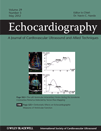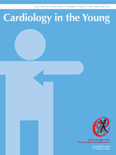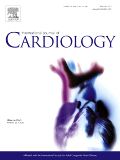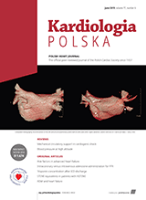
ECHOCARDIOGRAPHY-A JOURNAL OF CARDIOVASCULAR ULTRASOUND AND ALLIED TECHNIQUES
Scope & Guideline
Pioneering Research in Cardiovascular Ultrasound
Introduction
Aims and Scopes
- Echocardiographic Techniques and Innovations:
The journal emphasizes the development and implementation of new echocardiographic techniques, including three-dimensional echocardiography, speckle tracking, and automated assessment tools, aimed at improving diagnostic accuracy and patient outcomes. - Clinical Applications in Cardiovascular Disease:
Research published in this journal frequently explores the clinical implications of echocardiography in diagnosing and managing a wide range of cardiovascular conditions, including heart failure, valvular diseases, congenital heart defects, and post-surgical assessments. - Multimodality Imaging Approaches:
There is a significant focus on the integration of echocardiography with other imaging modalities such as cardiac MRI, CT, and nuclear imaging to enhance diagnostic capabilities and therapeutic decision-making. - Emerging Biomarkers and Prognostic Indicators:
The journal highlights studies investigating novel echocardiographic parameters and biomarkers that can predict cardiovascular events, disease progression, and responses to therapies, thereby aiding in risk stratification. - Pediatric and Fetal Echocardiography:
A considerable portion of the research is dedicated to pediatric and fetal echocardiography, addressing unique challenges and advancements in diagnosing congenital heart defects and cardiac conditions in younger populations. - Echocardiography in Special Populations:
The journal also covers the application of echocardiography in specific populations, including patients with diabetes, cancer, and COVID-19, focusing on tailored diagnostic and management strategies.
Trending and Emerging
- Artificial Intelligence and Machine Learning in Echocardiography:
Research utilizing AI and machine learning techniques for the automated analysis of echocardiographic data is gaining momentum, reflecting a broader trend towards integrating technology to enhance diagnostic precision and efficiency. - Advanced Strain Imaging Techniques:
There is an increasing focus on advanced strain imaging techniques, including global longitudinal strain and layer-specific strain, which offer deeper insights into myocardial function and are becoming standard in assessing various cardiac conditions. - Telemedicine and Remote Echocardiography:
The COVID-19 pandemic has accelerated interest in telemedicine and remote echocardiography, with studies exploring the effectiveness and feasibility of remote consultations and point-of-care ultrasound in managing cardiovascular patients. - Personalized Medicine Approaches in Cardiology:
Emerging research emphasizes personalized medicine strategies, utilizing echocardiographic findings to tailor treatment plans for individual patients, particularly in populations with complex comorbidities. - Echocardiography in Cancer Patients:
Growing attention is being directed towards the role of echocardiography in monitoring cardiac function in cancer patients undergoing therapies that may induce cardiotoxicity, highlighting the need for proactive cardiovascular care.
Declining or Waning
- Traditional Two-Dimensional Echocardiography:
There has been a noticeable decline in studies focusing solely on traditional two-dimensional echocardiographic assessments as newer techniques like 3D echocardiography and strain imaging gain prominence for their superior diagnostic capabilities. - Basic Echocardiographic Measurements without Advanced Analysis:
Research relying on basic echocardiographic measurements, such as simple ejection fraction calculations, is decreasing as there is a shift towards utilizing more complex analyses involving strain and tissue Doppler imaging to provide better insights into cardiac function. - Echo-Doppler Studies in Isolation:
There is a waning interest in echo-Doppler studies without the integration of advanced imaging techniques or multimodality approaches, as practitioners seek comprehensive evaluations that combine various imaging modalities for improved patient outcomes. - Echocardiographic Studies with Limited Clinical Application:
Several studies that focus on echocardiographic findings without direct clinical application or implications are becoming less frequent, as there is a growing demand for research that provides actionable insights into patient care.
Similar Journals

JACC-Cardiovascular Imaging
Exploring the Depths of Cardiovascular DiagnosticsJACC-Cardiovascular Imaging, published by Elsevier Science Inc, is a premier journal that focuses on the rapidly evolving field of cardiovascular imaging, providing a vital platform for the dissemination of high-quality research and clinical studies. With an impressive impact factor and ranking within the top tier of cardiology and radiology specialties, the journal is recognized for its commitment to advancing knowledge in diagnostic imaging techniques, including echocardiography, MRI, and CT in cardiovascular contexts. Since its inception in 2008 and converging through 2024, JACC-Cardiovascular Imaging has maintained a distinguished position, currently ranking Q1 both in Cardiology and Cardiovascular Medicine as well as in Radiology, Nuclear Medicine and Imaging. This ensures its relevance and influence, as evidenced by its Scopus rankings—ranked #2 in Radiology and #8 in Cardiology, placing it in the top echelons of scholarly output. Although it does not offer open access, the journal's content is crucial for researchers, clinicians, and students who seek to remain at the forefront of cardiovascular imaging advancements.

CARDIOLOGY IN THE YOUNG
Empowering clinicians with cutting-edge insights into young hearts.CARDIOLOGY IN THE YOUNG is a premier journal published by Cambridge University Press, dedicated to the field of pediatric cardiology and cardiovascular medicine. Established in 1991, this journal has become a vital resource for researchers, clinicians, and students, focusing on the latest advancements and clinical practices related to heart conditions in children and young adults. With an ISSN of 1047-9511 and an E-ISSN of 1467-1107, it operates under a non-open access model, ensuring high-quality, peer-reviewed research is accessible to professionals in the field. The journal is recognized in the Q3 category across several disciplines, including Cardiology and Cardiovascular Medicine, Medicine (miscellaneous), and Pediatrics, Perinatology and Child Health, highlighting its significant academic standing within the medical community. As it converges its focus towards 2024, CARDIOLOGY IN THE YOUNG remains committed to enhancing the understanding and treatment of cardiovascular disorders, making it an essential publication for those devoted to advancing health outcomes in young populations.

International Journal of Cardiology
Empowering Cardiology Research to Transform Patient CareThe International Journal of Cardiology is a premier publication in the field of Cardiology and Cardiovascular Medicine, published by Elsevier Ireland Ltd. With an impressive impact factor and ranked in the top quartile (Q1) of its category, this journal serves as a vital resource for researchers, clinicians, and scholars committed to advancing cardiovascular health. Founded in 1981, the journal has been pivotal in disseminating significant findings, with a wide-ranging scope that includes original research, reviews, and clinical studies aimed at improving patient outcomes and understanding heart diseases. Its robust ranking of #73 out of 387 in Scopus ensures that it remains a leading platform for impactful cardiovascular research. While currently not an open-access publication, the journal's commitment to quality and relevance makes it an essential reference point within an ever-evolving medical landscape. For those engaged in cardiovascular research, the International Journal of Cardiology is not just a journal; it's an indispensable source of knowledge shaping the future of heart health.

Minerva Cardiology and Angiology
Shaping the future of cardiovascular health through scholarship.Minerva Cardiology and Angiology, published by EDIZIONI MINERVA MEDICA, is a prominent journal in the field of cardiology and cardiovascular medicine, with an ISSN of 2724-5683 and E-ISSN of 2724-5772. Established in 2021, this journal aims to foster the dissemination of cutting-edge research, clinical practice guidelines, and innovative methodologies relevant to cardiovascular health. As of 2023, it holds a commendable Q3 quartile rank in its category, reflecting its growing influence within the scientific community. The journal is indexed in Scopus, where it ranks #221 out of 387 in its field, placing it in the 43rd percentile overall. Although it currently does not offer Open Access options, articles published in Minerva Cardiology and Angiology contribute significantly to ongoing discussions and advancements in heart and vascular health. The journal serves as an invaluable resource for researchers, healthcare professionals, and students seeking to stay informed on the latest developments in cardiology.

Expert Review of Cardiovascular Therapy
Connecting Theory and Practice in Cardiovascular TherapyExpert Review of Cardiovascular Therapy is a leading academic journal published by TAYLOR & FRANCIS INC, focusing on innovative and impactful research in the field of cardiovascular medicine. With an ISSN of 1477-9072 and an E-ISSN of 1744-8344, this journal serves as an essential resource for researchers, clinicians, and educators, offering a platform for the dissemination of critical advancements in cardiovascular therapy and internal medicine. Since its inception in 2003, the journal has maintained a reputable standing with a Q2 ranking in various categories including Cardiology and Cardiovascular Medicine, reflecting its influence and rigor in the field. The journal, which is based in the United Kingdom, does not currently offer Open Access options, ensuring that its content is accessible primarily to subscribers. With its commitment to high-quality, peer-reviewed articles, Expert Review of Cardiovascular Therapy is dedicated to bridging the gap between experimental research and clinical application, thereby enhancing patient care and therapeutic outcomes in cardiovascular health.

Current Cardiovascular Imaging Reports
Advancing Innovations in Cardiovascular ImagingCurrent Cardiovascular Imaging Reports, published by SPRINGER, is a notable academic journal within the field of cardiovascular imaging. With its ISSN 1941-9066 and E-ISSN 1941-9074, this journal has been a critical resource since its inception in 2008, aiming to disseminate high-quality research and reviews in the realm of cardiovascular diagnostics and imaging technologies. Though currently categorized within the Q3 and Q4 quartiles for various fields such as Applied Microbiology and Biotechnology, Histology, and Cell Biology, its impact and relevance are growing steadily. Researchers and practitioners can benefit from the insights presented in this journal, especially as it covers advancements and practical applications in cardiovascular imaging techniques crucial for enhancing patient care. Given its ongoing commitment to open access, although not currently available, readers can engage with significant research findings that may inform future studies and applications in cardiology. With plans to converge towards 2024, this journal is poised to facilitate the exchange of knowledge and foster innovation within its dynamic field.

Journal of Echocardiography
Connecting Knowledge with Cardiac InnovationThe Journal of Echocardiography, published by SPRINGER JAPAN KK, is a leading periodical dedicated to advancing the field of echocardiography and cardiac imaging. With an ISSN of 1349-0222 and an E-ISSN of 1880-344X, this journal serves as a vital resource for researchers, clinicians, and students alike, providing a platform for the dissemination of innovative research, case studies, and reviews focused on the latest echocardiographic techniques and applications. Operating under a prestigious publisher with a noteworthy reputation in the academic community, the journal features contributions that significantly impact the current understanding of cardiac health, making it essential reading for those in the fields of medicine, radiology, and imaging. As recognized in the 2023 Category Quartiles, it holds a solid Q3 ranking within the Radiology, Nuclear Medicine and Imaging category, further highlighting its relevance within the field, where it ranks #170 out of 333 according to Scopus. With coverage spanning from 2003 to 2024, the Journal of Echocardiography is committed to fostering an inclusive and comprehensive dialogue on the developments that shape modern echocardiographic practice.

Kardiologia Polska
Connecting Global Minds in Heart Health ResearchKardiologia Polska, the esteemed journal of the Polish Cardiac Society, has established itself as a vital resource in the field of cardiology and cardiovascular medicine since its inception in 1954. With an ISSN of 0022-9032 and an E-ISSN of 1897-4279, this journal serves as a platform for groundbreaking research and scholarly articles that contribute to the advancement of heart health. Although currently not an open access journal, it remains an essential reference for practitioners and researchers seeking to stay abreast of the latest developments in cardiovascular science. The journal reflects its scholarly depth through a Category Quartile of Q3 and a commendable Scopus ranking at the 48th percentile in its field. Published primarily in Poland, it caters to a global audience eager to explore comprehensive studies spanning clinical cardiology, innovative therapeutic approaches, and emerging cardiovascular trends. Join a thriving academic community by engaging with the invaluable insights and research contributions found within the pages of Kardiologia Polska.

Cardiovascular Ultrasound
Revolutionizing patient care with open-access ultrasound insights.Cardiovascular Ultrasound, published by BMC, is a leading open-access journal dedicated to advancing the field of cardiovascular imaging through ultrasound techniques. Since its inception in 2003, this esteemed journal has provided a platform for high-quality research and innovative methodologies, contributing significantly to both cardiology and radiology. With an impressive impact in the academic community, it consistently ranks in the Q2 category for Cardiology and Cardiovascular Medicine, as well as in Medicine (Miscellaneous) and Radiology, Nuclear Medicine, and Imaging, as per the 2023 metrics. The journal aims to disseminate critical knowledge that enhances diagnostic practices, patient care, and clinical outcomes, making it an essential resource for researchers, clinicians, and students. Emphasizing the importance of accessible knowledge, Cardiovascular Ultrasound ensures that all published articles are freely available, fostering collaboration and innovation across the global community of cardiovascular professionals.

Congenital Heart Disease
Illuminating the path to better outcomes in congenital heart disease.Congenital Heart Disease, published by TECH SCIENCE PRESS, is a pivotal academic journal focusing on the complexities of congenital heart conditions. With an ISSN of 1747-079X and an E-ISSN of 1747-0803, this journal serves as a crucial platform for researchers and healthcare professionals engaged in cardiology, pediatrics, and related fields. Established in 2006 and continuing through to 2024, it aims to disseminate insightful research findings and reviews that advance the understanding of congenital heart diseases and their management. The journal currently holds a Q4 classification in cardiology and cardiovascular medicine, with rankings in various medical categories highlighting its dedication to emerging research. Although it does not offer open access, its contributions are vital for professionals seeking to explore innovative strategies and collaborative solutions in congenital heart disease management. As it continues to navigate the evolving landscape of pediatric cardiac health, Congenital Heart Disease is committed to fostering a community of knowledge that impacts both clinical practices and academic inquiry.